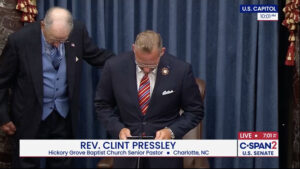
WASHINGTON (BP)–The U.S. Supreme Court announced March 17 it will review a lower court’s ruling that had stymied the federal government’s attempt to restrict indecent language on television and radio broadcasts.
The Federal Communications Commission (FCC), with the support of the Department of Justice, urged the high court to accept the case after a three-judge panel of the Second Circuit Court of Appeals in New York rejected an FCC ruling that the uses of obscenities in live TV programs in 2002 and 2003 were indecent.
The justices will hear oral arguments in the case, FCC v. Fox, during their next term, which begins in October.
The case focuses on whether the “fleeting” use of indecent language violates federal standards. The FCC had determined that live Fox Channel prime-time broadcasts of the 2002 and 2003 Billboard Music Awards programs transgressed decency standards by use of the F-word and/or S-word.
Those decisions followed an FCC ruling that a single use of the F-word on the 2003 Golden Globes Awards on NBC was indecent. That marked a change in policy for the panel, which previously had relied on a requirement that the use of an expletive must be more than “fleeting.” In the Golden Globes case, the FCC ruled that the solitary use of the F-word can offend decency standards.
The Second Circuit majority, however, ruled in June 2007 that the FCC’s revised policy was “a significant departure” from its previous rulings; the court returned the case to the federal commission to give it an opportunity to explain its reasoning further.
The Parents Television Council (PTC) applauded the Supreme Court’s decision to review the Second Circuit ruling.
“Such harsh, unedited profanity is unacceptable for broadcast over the publicly owned airwaves when children are likely to be watching,” PTC President Tim Winter said in a written release. “[T]he Second Circuit Court of Appeals had, in essence, stolen the airwaves from the public and handed ownership over to the broadcast industry.
“Broadcasters are only given a license to use the airwaves in the public interest and convenience; therefore the American people have a reasonable and time-honored expectation that the airwaves will be used in a manner that is beneficial to them,” Winter said. “If broadcasters feel they absolutely must do so, they can legally air indecent material after 10:00 p.m.”
The Southern Baptist Ethics & Religious Liberty Commission, the PTC and other pro-family organizations are promoting a bill seeking to remedy the Second Circuit’s decision. The Protecting Children From Indecent Programming Act, S. 1780, would require the FCC to “maintain a policy that a single word or image may constitute indecent programming.” The Senate Commerce, Science and Transportation Committee has forwarded the legislation to the full Senate but no further action has been taken.
“Profanity by its very nature is ‘fleeting,’ and thus that is no defense for its use except during the time established by the Supreme Court,” Winter said.
The legislative and executive branches of the federal government have worked in recent years to stiffen penalties against broadcast indecency. President Bush signed into law in 2006 a measure overwhelmingly approved by Congress that increased the maximum fine for each decency violation by 10 times to $325,000.
Pro-family organizations have long criticized the sexual content, plus obscene and profane language, on prime-time television. The 2004 Super Bowl halftime show pushed the issue into the national spotlight and motivated Congress to take action. Janet Jackson’s exposure on national TV capped a controversial show and brought a deluge of criticism from many Americans, including legislators and the FCC.
–30–
Compiled by Tom Strode, Baptist Press Washington bureau chief, with reporting by Katherine Kipp, BP Washington intern.













